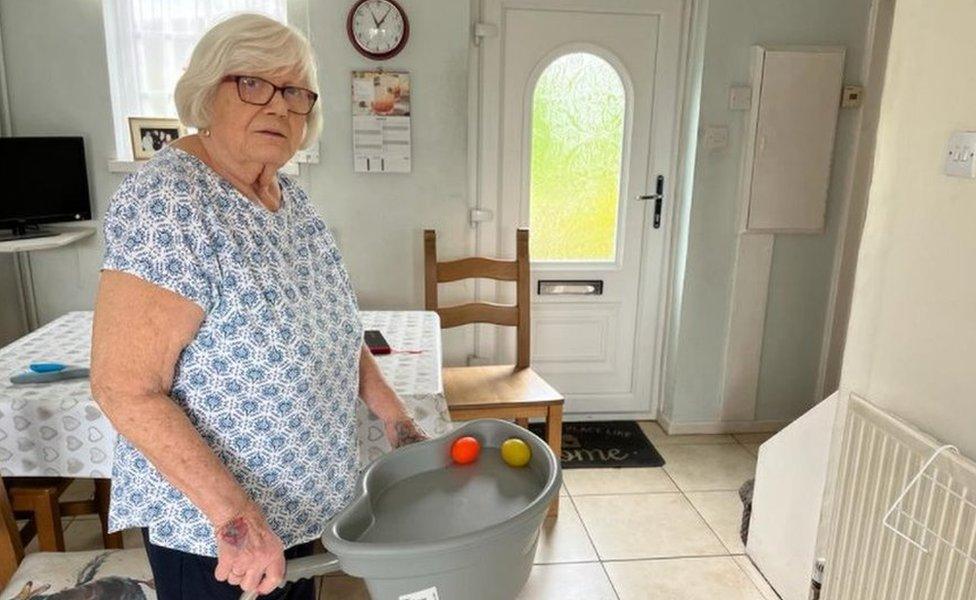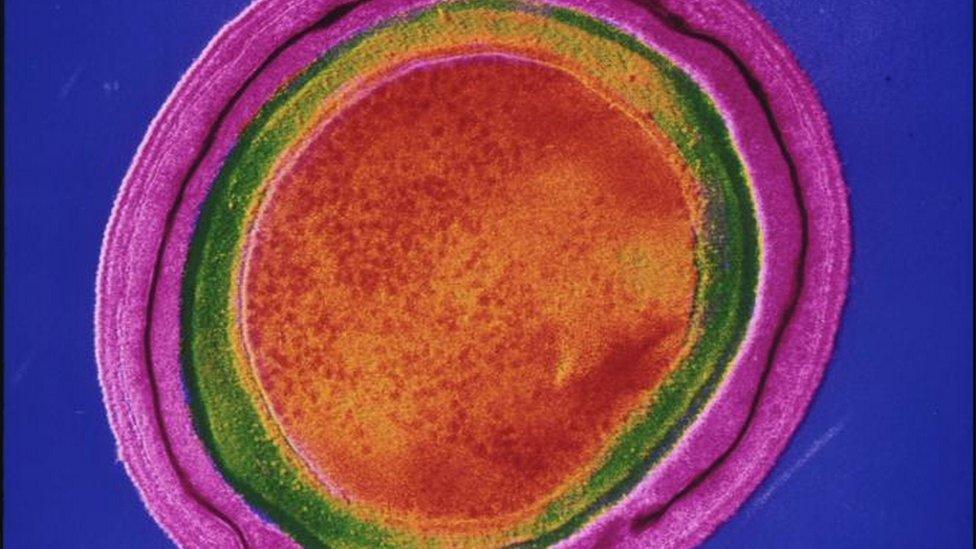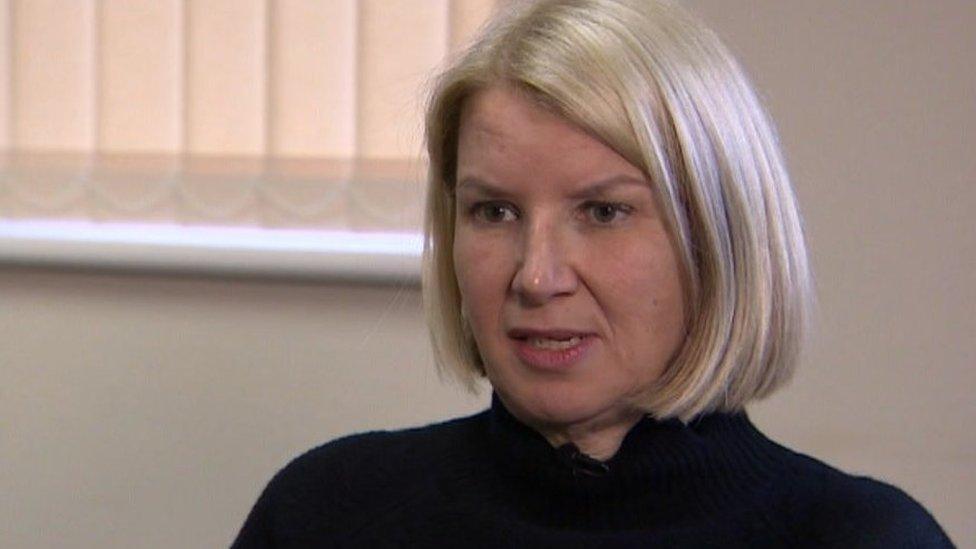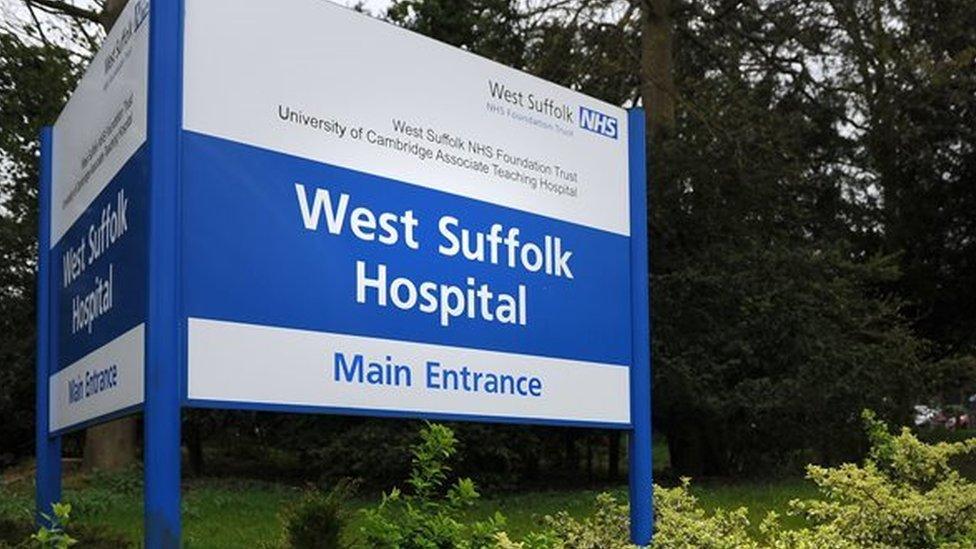Hinchingbrooke Hospital patient sent 'whistleblower' letters
- Published

Marilyn Smith received three letters purporting to be from staff at Hinchingbrooke Hospital describing shortcomings in her care
A patient who spent months in hospital because of a medical error received anonymous letters alleging safety concerns at the unit that treated her.
Marilyn Smith was diagnosed with tetanus after she was discharged following treatment for a leg injury at Hinchingbrooke Hospital in Huntingdon, Cambridgeshire.
She said the hospital had not checked that she had not been immunised.
The NHS trust that runs the hospital said it had apologised to her.
Ms Smith, 75, gashed her leg in a fall in her garden in Huntingdon in September 2021.
She said she was not asked about her tetanus immunisation status and was discharged from Hinchingbrooke without a booster shot.
The NHS vaccination guide, known as The Green Book, external, states that anybody born before 1961 needs to be asked this and given a booster if needed.
'Band on my jaw'
A few days later she woke up with trismus, commonly known as lockjaw, and was unable to open her mouth - a symptom of tetanus, external, which only a handful of people contract in the UK each year.
Ms Smith said: "I tried to clean my teeth but I couldn't get a toothbrush in my mouth.
"It was horrendous - it was just tightening and tightening like somebody had put a band on my jaw."
She subsequently spent more than 120 days in hospital in Hinchingbrooke, and then Peterborough, when her condition worsened and she was moved to critical care, placed in an induced coma and needed intubation.
She said she now struggled to walk.
"Prior to this I looked after my grandchildren, played football with them and everything," she said.
A report published by the North West Anglia NHS Foundation Trust, which runs Hinchingbrooke, described "shortcomings" in Ms Smith's care and that the hospital "could do better" with "multiple failed opportunities to confirm Mrs Smith's current tetanus status".

The NHS trust that runs Hinchingbrooke said "when issues are raised we take action to investigate and learn from them"
She received the first anonymous letter, claiming to be from "a group of current and previous A&E staff at Hinchingbrooke", in the post in January after she had been home from hospital for two weeks.
"It wasn't a letter to me, but a letter about me," Ms Smith said.
It described alleged shortcomings in her care.
Two subsequent letters made similar claims and on the same day the third arrived at her house, on 24 February, the BBC also received one giving Ms Smith's name and address and describing the alleged failures in her initial care.
This letter stated "the trust has been ignoring concerns about patient safety" and contained further allegations that related to an individual.
A fourth letter arrived at Ms Smith's home on Saturday.
'Deeply concerning'
Ms Smith described the letters as a "shock".
"You think 'wow, who sent this?'; you think 'whoa, hold on a minute, how many other people have suffered like this?'," she said.
She has since instructed a lawyer to look at her case because, she said, she did not want anybody else to suffer like she had.
In 2018, the husband of a patient at the West Suffolk Hospital in Bury St Edmunds received an anonymous letter detailing errors in his late wife's care after she was given an incorrect drip after she was admitted with a perforated bowel.
The West Suffolk NHS Foundation Trust was criticised in a subsequent report after it asked staff for fingerprint and handwriting samples as it hunted for the letter writer.
Tim Deeming from law firm Tees, which is representing Ms Smith, said he also had concerns about the Hinchingbrooke whistleblowing policy.
"The anonymous letters from the A&E staff, both past and present, are deeply concerning, especially given that they highlight the tragic outcomes of other patients who have been affected, and that staff indicate that they have raised concerns over the past five years," he said.
He said that "reassurance is urgently needed from the trust's leadership about these allegations, any investigations, and the wider culture so that effective improvements can be embedded where required."

Tetanus and vaccination

Tetanus is a life-threatening but preventable disease caused by a neurotoxin produced by the clostridium tetani bacterial spore
Tetanus is very rare in the UK
In 2020, there were just seven cases, external, of which two were fatal, and cases are predominantly among people born before 1961, when children began to be routinely immunised
Five doses of vaccine provide long-term protection with routine boosters every 10 years no longer recommended
Tetanus bacteria are found in soil and the manure of animals such as horses and cows, and enter the body through a wound
Other symptoms include muscle spasms, breathing difficulties, high temperature, sweating and a rapid heartbeat

The North West Anglia NHS Foundation Trust confirmed it had received a similar letter in October but after an investigation concluded there was no substance to the allegations about patient safety.
In a statement, Caroline Walker, chief executive of the trust, said they were meeting Ms Smith this week to discuss its investigation and report.
"I would like to apologise to Marilyn Smith for the failure to identify her condition as quickly as we should have," she said.
"Due to the rarity and severity of [her] condition, a clinical investigation took place to review the level of care experienced.
"We welcome the fact that our staff feel able to raise concerns.
"We have worked hard, with the support of our Freedom To Speak Up Guardian, to encourage an environment where speaking up is something people can do with confidence.
"When issues are raised we take action to investigate and learn from them.

Find BBC News: East of England on Facebook, external, Instagram, external and Twitter, external. If you have a story suggestion email eastofenglandnews@bbc.co.uk, external
- Published9 December 2021

- Published28 July 2021

- Published13 April 2021

- Published7 September 2020

- Published30 January 2020
